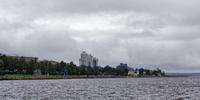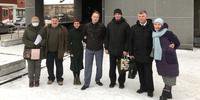The Case of Amosov and Others in Petrozavodsk
Filter
- #
Lieutenant Colonel of Justice M. V. Golubenko, Deputy Head of the Federal Security Service Directorate for the Republic of Karelia, makes a decision to initiate a criminal case against 42-year-old Maxim Amosov under Part 1 of Article 282.2 of the Criminal Code of the Russian Federation.
The basis for initiating the case is the report of the detective of the Department of the Service for the Protection of the Constitutional Order and Combating Terrorism (NWKBT) of the Federal Security Service of Russia in the Republic of Karelia, Senior Lieutenant M. N. Dmitriev.
- #
In Petrozavodsk, the FSB Directorate for the Republic of Karelia conducts at least 11 searches in the homes and workplaces of citizens who are believed to be Jehovah's Witnesses. Believers are detained for interrogation, some overnight.
Senior investigator of the Investigative Department of the FSB of Russia in the Republic of Karelia, Major of Justice S. V. Grigoriev chooses a preventive measure against Maxim Amosov in the form of a written undertaking not to leave and proper behavior. At the same time, law enforcement officers take into account the fact that the believer has not been previously convicted, has not been prosecuted, has a permanent place of residence and work, and is married.
- #
Investigator Grigoriev decides temporarily, until a decision is made in the criminal case, to restrict Amosov's right to leave the Russian Federation.
A criminal case is initiated against Nikolay Leshchenko and a preventive measure is chosen in the form of a written undertaking not to leave and proper behavior.
- #
Maksim Amosov and Nikolay Leshchenko are charged with committing a crime under Part 1 of Article 282.2 of the Criminal Code of the Russian Federation. The investigation claims that believers, gathering to read and discuss the Bible, act "jointly and harmoniously, united by a single criminal intent aimed at committing illegal acts."
- #
FSB officers detain Mikhail Gordeev at his workplace. The believer is searched and the tablet is seized. After that, he is taken away for interrogation, which lasts 4 hours.
A criminal case is being opened against Gordeev under Part 1 of Article 282.2 of the Criminal Code of the Russian Federation.
He is chosen a measure of restraint in the form of a written undertaking not to leave.
- #
- #
Mikhail Gordeev is involved as a defendant in a criminal case.
The investigator appoints linguistic and religious forensic examinations.
- #
The security forces are conducting a search at the workplace of Dmitry Ravnushkin, an electronic device is seized from him. The believer is detained and taken to the FSB department for interrogation, which lasts 4 hours.
A criminal case is being opened against Dmitriy under Part 1 of Article 282.2 of the Criminal Code of the Russian Federation. He is chosen a measure of restraint in the form of a written undertaking not to leave and proper behavior.
- #
- #
Due to the epidemiological situation, the preliminary investigation against Nikolai Leshchenko and Mikhail Gordeev is suspended "to ensure the safety of life and health of the accused."
- #
The preliminary investigation in the case of Leshchenko is resumed and accepted for production by investigator Grigoriev.
- #
Mikhail Gordeev, Maksim Amosov, Nikolay Leshchenko and Dmitry Ravnushkin file motions to dismiss the criminal case based on the opinion of the UN Working Group on Arbitrary Detention.
- #
The petition to terminate the criminal case was denied to the believers.
- #
Investigator S. V. Grigoriev summons four believers for interrogation and presents them with the final version of the indictment.
- #
The case against Maksim Amosov, Nikolay Leshchenko, Mikhail Gordeev and Dmitry Ravnushkin is submitted to the Petrozavodsk City Court of the Republic of Karelia for consideration by Judge Marina Nosova.
- #
The consideration of the case in court begins. 15 people come to support the believers. Court staff do not interfere with them from communicating with the defendants in the lobby.
The judge, the prosecutor and the secretary behave correctly. They kindly answer the questions of believers.
Judge Marina Nosova explains in detail to the defendants Article 51 of the Constitution and emphasizes that the court will not use silence against them, and gives written permission to move outside the city of Petrozavodsk for 2 months.
- #
There is a replacement of the state prosecutor Varfolomeeva with Ivanova, as well as lawyer Nikolai Leshchenko.
In response to the lawyer's request for publicity, the court responds that it is not possible to comply with social distancing measures, but allows participants to record the process and transfer audio recordings to third parties.
The prosecutor reads out the indictment. Among other things, it states 4 times that the Supreme Court of the Russian Federation in 2017 banned 2500 religious groups of Jehovah's Witnesses, which is not true.
Believers do not admit guilt in extremism, and also declare that they did not and do not have motives of hatred and enmity towards any group of people on religious or other grounds.
- #
Maksim Amosov reads out all 10 pages of his attitude to the charges. The judge does not interrupt and listens attentively. The other defendants then give a brief statement of their views on the charges.
Mikhail Gordeev says: "I consider the accusation absurd, unfounded, unfair. It humiliates my human dignity, insults my religious feelings, and denigrates my reputation. I have to consider it as discrimination on religious grounds, as well as a violation of the right to profess one's faith."
Nikolay Leshchenko emphasizes: "All my actions, which the prosecution considers illegal, are nothing more than a peaceful confession of my religious beliefs ... I have not felt and do not feel hatred and enmity towards anyone, and did not participate in any illegal actions. The very meaning of extremism is alien to my faith and to me."
Dmitry Ravnushkin adds: "We are guided by biblical principles, in particular, I am in my family and personal life. And one of them is to love your neighbor as yourself. I have no hatred or cruelty... There were no calls related to extremism, nor any expression of hostility in my actions."
The state prosecutor voices the materials of the case. In particular, he mentions the conclusions of an expert linguist, according to which in the submitted materials "no statements were found that deal with the advantage of a person or a group of persons over other people on the grounds of attitude to religion, belonging to any social group," or a negative assessment of someone on the same basis.
- #
The questioning of prosecution witnesses begins.
One of them answers most of the questions uncertainly, adding at the end of the answer "probably", "in my opinion", "I don't remember exactly".
The defense notes that the testimony of one of the witnesses in court diverges from the written ones. As a result, it turns out that the woman attended the services of Jehovah's Witnesses in 2009-10 - that is, during a period that does not apply to the case under consideration.
One of Mikhail Gordeev's employees is being interrogated. He speaks of the believer as a very good worker. Their relations in the team were smooth, not conflicting.
- #
The court is interrogating Vladimir Gusev, Head of the Department for Non-Profit Organizations of the Department of the Ministry of Justice of the Russian Federation for the Republic of Karelia.
The defender of one of the believers asks the witness: "In connection with the decision of the Supreme Court of the Russian Federation [of 20.04.2017 on the prohibition of local religious organizations], could the activity related to issues of faith continue, is it possible to continue to believe?" He answers: "As far as I know, how can you forbid believing at all? In principle, we do not deal with these issues, we do not go and find out who believes in what.
- #
In connection with the replacement of the judge and the adjournment of the trial, the consideration of the case begins anew. Defendants Maxim Amosov and Mikhail Gordeev voice their attitude to the charges. The judge reads out the case materials and transcripts.
- #
About 15 people come to the meeting to support the believers, but listeners are not invited to the hall. The court session is held behind closed doors.
When the case materials are announced, Judge Sergeyev reads out the prayers said at the liturgical meetings in full, pronounces the name of God correctly, and reads out Bible verses several times.
- #
The materials of the case are announced. The court closes the session when the materials of correspondence from the messenger from Maxim Amosov's mobile phone are announced, the listeners are removed at this time. After the announcement of the materials of the correspondence, the listeners are again invited to the courtroom.
The next hearings are scheduled for May 12, June 16 and June 17, 2022.
- #
The court examines the materials of the case - volumes from 15 to 22. The state prosecutor voices only page numbers and does not disclose specific data from the materials. Judge Stepan Sergeyev notes among the attached documents those that relate to the period before 2017, that is, before the liquidation of legal entities of Jehovah's Witnesses in Russia.
- #
The hearing is attended by Amosov's wives, Ravnushkina and Leshchenko.
The court is considering the conclusion of the linguistic examination of the audio recording of the believers' conversations. According to the document, they "do not contain statements that deal with the advantage and negative assessment of one person or group of persons over other people on the grounds of attitude to religion, belonging to any social group."
- #
About 15 people come to the courthouse to support the believers. The court continues to examine the materials of the case. Among them are the conclusions of an expert religious scholar, who, according to the defense, used information from unreliable sources in his conclusions.
The Court notes that volume 33 contains documents dating from the 1990s to the 2000s and it is not clear what they confirm.
- #
The court reads out excerpts from the personality characteristics of Gordeev and Ravnushkin: each of them is described positively at the place of work.
The case file contains letters of thanks to the Gordeevs' parents from the school where their daughters study. The judge reads out the diploma and certificates of children for excellent studies, good behavior and participation in the city competition.
The wives of the defendants are present at the hearing.
- #
Prosecution witnesses are being questioned. All three use Article 51 of the Constitution of the Russian Federation.
The judge shall grant the prosecutor's request for the disclosure of the testimony of witnesses given by them during the preliminary investigation. Two explain to the court that they were interrogated by the investigator in a stressful state. In addition, one of the witnesses says that pressure was put on her.
- #
The director of the organization in which Maxim Amosov works is being interrogated. He says of the believer: "Excellent employee, executive, without bad habits. You can rely on it one hundred percent. I've never seen a better employee than him."
The court is also questioning a woman who last attended Jehovah's Witnesses services in 2006. According to her, she communicates on religious topics only with her husband. The testimony of 12 other prosecution witnesses is then read out.
- #
The questioning of prosecution witnesses is ongoing. Nikolay Leshchenko's neighbor, who has known the believer for about 5 years, cannot say anything bad about him. The witness is not sure that the voice on the audio recording provided to him belongs to Nikolai.
A former colleague of Dmitry Ravnushkin says that the relationship with the defendant was respectful, there were no conflicts.
The testimonies of witnesses who did not appear are also read out. A woman who attended Jehovah's Witnesses' worship services before 2017 says they have no ranks of any kind and that she does not know any of the defendants.
- #
The prosecution witness, the chairman of the homeowners' association of the house where Nikolai Leshchenko lives, is being interrogated. The woman says that she worked with him in the HOA. She says: "Nikolai Grigorievich is characterized positively, often responded to requests, provided assistance. He never made any negative statements about anyone."
Another prosecution witness, whose close relatives are Jehovah's Witnesses, describes Leshchenko as a good person, always ready to help. The man claims that the investigator pressured him during the interrogation, threatening to take the children away and send them to an orphanage if he did not testify.
- #
During the interrogation, operational officers say that in 2019 they organized the installation of recording equipment in the FSB office for the secret collection of voice samples of the defendants.
- #
Interrogation of Vladimir Gusev, Head of the Department for Non-Profit Organizations of the Department of the Ministry of Justice in the Republic of Karelia. He explains that after the liquidation of the legal entities of Jehovah's Witnesses, citizens can still practice the doctrine of this denomination.
The next witness for the prosecution is a young woman who had previously been one of Jehovah's Witnesses but then voluntarily stopped attending their meetings. She says that she was "not forced to leave or stay, everything was respectful." She also explains that Jehovah's Witnesses are "peaceful people, they act out of love, they treat this way not only to people of their religion, but to everyone in general." According to her, she had never heard extremist statements from the defendants.
- #
A witness for the prosecution, a colleague of Andrei Gordeev, characterizes him as a responsible employee, a good driver, to whom there have never been any complaints.
- #
The prosecutor asks the court to impose fines on the believers: Amosov, Leshchenko and Ravnushkin 550,000 rubles each, Gordeev 500,000 rubles.
The last word of the defendant Dmitry Ravnushkin in Petrozavodsk The last word of the defendant Maksim Amosov in Petrozavodsk The last word of the defendant Mikhail Gordeev in Petrozavodsk The last word of the defendant Nikolay Leshchenko in Petrozavodsk - #


